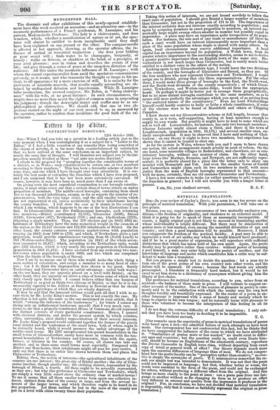METRICAL TRANSLATION.
Sin—In your review of Cayley's Dante, you seem to me too severe on the principle of metrical translation. With your permission, I will take one or two points. Success, you say, requires the concurrence of two mutually exclusive con- ditions,—the freedom of originality, and obedience to an external model. I think it is going too far to speak of these as necessarily incompatible. Of course, a highly original poet is not likely to succeed in translating another whose individuality is totally different. But there may be similarities of genius more or less marked, even among the manifold diversities of age and country ; and then a good translation will be possible. Moreover, I think you exaggerate the freedom of the poetical faculty.. A poet may be able to appreciate a work of art unlike any which he would himself have produced; and if he be a great master of expression, he will reproduce with sufficient distinctness that which has taken hold of his own mind. Again, the poetic faculty may be perceptive rather than creative : without power of becoming a poet himself, a man may enter fully into the poetry of another, and the knowledge of language and metre which. constitutes him a critic may be suf- ficient to make him a translator.
But you propose a simple test to decide the question : let a man try to turn one of the great poems of his own country into other words, and the failure will be apparent. Of course ; because the best words are already preoccupied. A translator is frequently hard tasked,. but it would be too cruel to set him down to a dictionary of synonymes without giving him the liberty of first choice.
The preference for metrical translations, according to you, arises from an accident—the badness of those made in prose. I will venture to suggest an- other account of the matter. One of the sources of pleasure in poetry is com- monly said to be the satisfaction with which the reader sees his own best thoughts forcibly and beautifully. expressed. So the reader of a poem in an- other language is impressed with a sense of beauty and melody which he longs to express in his own tongue ; and he naturally turns with pleasure to those who volunteer to become the interpreters of this feeling in all its fulness.
I do not deny the extreme difficulty of metrical translation ; I only sub- mit that you have been too hasty in deciding it to be impossible. Your obedient servant, T. C.
[Our remarks upon the superiority of prose to metrical translations of poems were based upon a fact—the admitted failure of such attempts as have been made. Our correspondent has not controverted this fact, but he thinks that we have exaggerated the influence of the cause to which we have attributed it. "Similarities of genius more or less marked" no doubt exist in differ- ent ages and countries ; but the question really is, could even Dante him- self, should he become an Englishman of the nineteenth century, reproduce the .Divina Commedia in English terza rima, without departing from exact copy of detail or general truth of effect ? Our theory depends much more upon the essential differences of language than of men. We do not compre- hend how the poetic faculty can be " perceptive rather than creative," as crea- tive is simply the synonyme of poetic. T. C. misconceives somewhat the re- sult our simple teat was intended to demonstrate. It was not that the poem could not be improved in language; but that, whether better or worse, the words were essential to the form of the poem, and could not be exchanged for others, without producing a different effect from the original. And t brings us more closely to the point at issue : can a poem pass from one lan- guage to another without so far changing its form as to produce an effect very different in amount and quality from the impression it produces in the original ? For, in conclusion, we have not decided that metrical translation is im ossible, only that it cannot so faithfully represent the original as prose translation.]


























 Previous page
Previous page